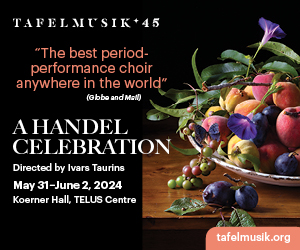As i sit down to write this I have just read the shocking news of Jeanne Lamon’s announcement of her intention to retire as music director of Tafelmusik Baroque Orchestra in 2014. After more than three decades at the helm of this flagship Canadian orchestra it is hard to imagine the organization without her. Although stepping down from the first chair (or stand as the case may be), she will evidently be staying on to help with the creation of the Tafelmusik International Baroque Academy. Of course the orchestra is such a well-oiled machine that there is no doubt it will continue to flourish, but the search is on for a new leader.
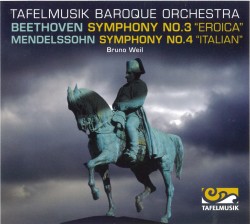 Under Lamon’s direction a fledgling semi-professional ensemble grew to become one of the world’s great period instrument orchestras and we are blessed with a wealth of recordings documenting her tenure. Although many of the original Sony releases have been discontinued, a number of key titles are now available again on the orchestra’s own imprint Tafelmusik Media which was launched earlier this year. The bulk of the early TM releases have been reissues of such important classics as Bach’s Brandenburg Concertos and Vivaldi’s Four Seasons, but this month marked an important new phase with recent live recordings from Koerner Hall. You will find a review of the 2011 Handel Messiah in next month’s issue but in recent weeks I have been enjoying performances of Beethoven’s Eroica and Mendelssohn’s Italian symphonies recorded in May of this year under the direction of Bruno Weil (TMK1019CD). The glorious sound of both the orchestra and the concert hall are captured expertly by German tone-meisters Stephan Schellmann and Peter Laenger. While Beethoven is not unfamiliar territory for Tafelmusik — they have recorded all of the concertos for Sony’s Vivarte label and Symphonies Five through Eight for Analekta — I believe this is their first recording of the music of Mendelssohn. I will leave the question of whether a baroque orchestra has any business venturing into the 19th century for others to debate. For my ears these brilliant and lively performances are totally satisfying. On this occasion the orchestral forces were supplemented to include 7-6-4-4-3 players in the string section with double woodwinds and trumpets and four horns. These latter are particularly worthy of note: Scott Weavers, Ronald George, Stéphane Mooser and David Parker for their impeccable intonation on that most difficult to control instrument, but well-deserved kudos go to all involved.
Under Lamon’s direction a fledgling semi-professional ensemble grew to become one of the world’s great period instrument orchestras and we are blessed with a wealth of recordings documenting her tenure. Although many of the original Sony releases have been discontinued, a number of key titles are now available again on the orchestra’s own imprint Tafelmusik Media which was launched earlier this year. The bulk of the early TM releases have been reissues of such important classics as Bach’s Brandenburg Concertos and Vivaldi’s Four Seasons, but this month marked an important new phase with recent live recordings from Koerner Hall. You will find a review of the 2011 Handel Messiah in next month’s issue but in recent weeks I have been enjoying performances of Beethoven’s Eroica and Mendelssohn’s Italian symphonies recorded in May of this year under the direction of Bruno Weil (TMK1019CD). The glorious sound of both the orchestra and the concert hall are captured expertly by German tone-meisters Stephan Schellmann and Peter Laenger. While Beethoven is not unfamiliar territory for Tafelmusik — they have recorded all of the concertos for Sony’s Vivarte label and Symphonies Five through Eight for Analekta — I believe this is their first recording of the music of Mendelssohn. I will leave the question of whether a baroque orchestra has any business venturing into the 19th century for others to debate. For my ears these brilliant and lively performances are totally satisfying. On this occasion the orchestral forces were supplemented to include 7-6-4-4-3 players in the string section with double woodwinds and trumpets and four horns. These latter are particularly worthy of note: Scott Weavers, Ronald George, Stéphane Mooser and David Parker for their impeccable intonation on that most difficult to control instrument, but well-deserved kudos go to all involved.
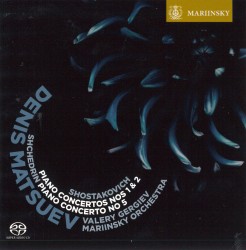 There is a Koerner Hall connection to the next disc as well, Shostakovich & Shchedrin – Piano Concertos with Denis Matsuev and the Mariinsky Orchestra under the direction of Valery Gergiev (Mariinsky SACD MAR0509). By the time this goes to print Valery Gergiev’s performance with the Stradivarius Ensemble will have come and gone, but we can look forward to Matsuev’s Koerner Hall debut in an all-Russian program on December 2. On that occasion the dynamic young pianist, winner of the 1998 International Tchaikovsky Competition in Moscow, will perform a solo recital of music by Tchaikovsky, Rachmaninoff and Stravinsky. On the current recording he is featured as soloist in more recent Russian works, including the introspective Piano Concerto No.5 by Rodion Shchedrin (b.1932) which was written around the same time as Matsuev’s Tchaikovsky competition win. The disc opens with the familiar Piano Concerto No.1 which Shostakovich wrote in 1933, with its ebullient rhythms and obbligato trumpet, and continues with his Piano Concerto No.2 from 1957. As the extensive liner notes in four languages point out, these works reflect rare happy periods in the composer’s often troubled life. Their allegro and even allegro brio movements seem almost out of character to my ears which are more accustomed to the languor and angst of his later compositions (culminating in the final string quartet with its five adagio movements only broken up by the inclusion of an adagio molto Funeral March). Matsuev seems to enjoy this playful side of Shostakovich and embraces the jollity of these works in crisp and exuberant performances. The unfamiliar Shchedrin concerto is more pointillistic and subdued, with darker colours from both the piano and the orchestral accompaniment. It is an extended work — more than half an hour in duration — with a slow middle movement of touching lyricism and hints of gamelan melodies. The rousing finale uses modal scalar passages, but this time allegro assai, in a pianistic molto perpetuo, with orchestral interventions somewhat reminiscent of Messiaen, that builds and builds over a nine minute crescendo. The soloist’s playing is superb and Gergiev’s control of the orchestra outstanding. Like the virtuoso ensemble itself, the Mariinsky Theatre boasts wonderful sound and it is captured here in all its splendour. Concert goers at Matsuev’s upcoming Toronto performance can look forward to a similar sonic treat in the acoustic of Koerner Hall.
There is a Koerner Hall connection to the next disc as well, Shostakovich & Shchedrin – Piano Concertos with Denis Matsuev and the Mariinsky Orchestra under the direction of Valery Gergiev (Mariinsky SACD MAR0509). By the time this goes to print Valery Gergiev’s performance with the Stradivarius Ensemble will have come and gone, but we can look forward to Matsuev’s Koerner Hall debut in an all-Russian program on December 2. On that occasion the dynamic young pianist, winner of the 1998 International Tchaikovsky Competition in Moscow, will perform a solo recital of music by Tchaikovsky, Rachmaninoff and Stravinsky. On the current recording he is featured as soloist in more recent Russian works, including the introspective Piano Concerto No.5 by Rodion Shchedrin (b.1932) which was written around the same time as Matsuev’s Tchaikovsky competition win. The disc opens with the familiar Piano Concerto No.1 which Shostakovich wrote in 1933, with its ebullient rhythms and obbligato trumpet, and continues with his Piano Concerto No.2 from 1957. As the extensive liner notes in four languages point out, these works reflect rare happy periods in the composer’s often troubled life. Their allegro and even allegro brio movements seem almost out of character to my ears which are more accustomed to the languor and angst of his later compositions (culminating in the final string quartet with its five adagio movements only broken up by the inclusion of an adagio molto Funeral March). Matsuev seems to enjoy this playful side of Shostakovich and embraces the jollity of these works in crisp and exuberant performances. The unfamiliar Shchedrin concerto is more pointillistic and subdued, with darker colours from both the piano and the orchestral accompaniment. It is an extended work — more than half an hour in duration — with a slow middle movement of touching lyricism and hints of gamelan melodies. The rousing finale uses modal scalar passages, but this time allegro assai, in a pianistic molto perpetuo, with orchestral interventions somewhat reminiscent of Messiaen, that builds and builds over a nine minute crescendo. The soloist’s playing is superb and Gergiev’s control of the orchestra outstanding. Like the virtuoso ensemble itself, the Mariinsky Theatre boasts wonderful sound and it is captured here in all its splendour. Concert goers at Matsuev’s upcoming Toronto performance can look forward to a similar sonic treat in the acoustic of Koerner Hall.
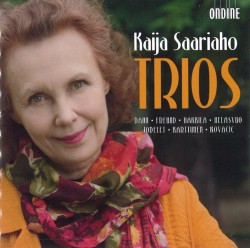 Last month I wrote about a disc of chamber music by Finnish composer Magnus Lindberg which featured cellist Annsi Karttunen on each of its tracks. Karttunen appears again this month on a disc of Trios by Kaija Saariaho (Ondine ODE 1189-2), once again in every piece with otherwise diverse instrumentation. In May 2011 the Toronto Symphony Orchestra presented the Canadian premiere of Saariaho’s Mirage for soprano Karita Mattila and cellist Karttunen with orchestra, a work written in 2007. Concurrently Saariaho produced a trio version of the haunting piece for soprano, cello and piano which was premiered in 2010 by, and dedicated to, the musicians who join Karttunen to reprise their performance on this disc, soprano Pia Freund and pianist Tuija Hakkila. The intimacy of this chamber version of Mirage is simply stunning. Another near-TSO connection occurs in the next piece, Cloud Trio, performed by the Zebra Trio which includes former TSO principal violist Steven Dann, Karttunen and violinist Ernst Kovacic. The eerie ethereal string timbres in this aptly named work have to be heard to be believed. Dann, Karttunen and Hakkila are featured in Je sens un deuxième coeur, a five movement work based on Saariaho’s 2003 opera Adriana Mater. It was originally intended to create musical portraits of four characters from the opera but when “she began to adapt the material for viola, cello and piano — a darker version of the traditional piano trio — the music began to distance itself from the opera.” It is certainly an effective chamber work not dependent on the programmatic inspiration for appreciation. The other offerings are Cendres for alto flute, cello and piano which involves extended techniques and vocalisms from the flutist (Mikael Hesasvuo), and Serenatas for percussion (Florent Jodelet), cello and piano. The latter once again draws on other Saariaho works as points of departure, in this case the cello concerto Notes on Light and, bringing the disc full circle, the opening piece Mirage. The simplicity of the title Trios notwithstanding, this recording presents a wealth of diverse textures and instruments with definitive performances by musicians who have collaborated extensively with Saariaho, one of the most distinctive voices in the music of our time.
Last month I wrote about a disc of chamber music by Finnish composer Magnus Lindberg which featured cellist Annsi Karttunen on each of its tracks. Karttunen appears again this month on a disc of Trios by Kaija Saariaho (Ondine ODE 1189-2), once again in every piece with otherwise diverse instrumentation. In May 2011 the Toronto Symphony Orchestra presented the Canadian premiere of Saariaho’s Mirage for soprano Karita Mattila and cellist Karttunen with orchestra, a work written in 2007. Concurrently Saariaho produced a trio version of the haunting piece for soprano, cello and piano which was premiered in 2010 by, and dedicated to, the musicians who join Karttunen to reprise their performance on this disc, soprano Pia Freund and pianist Tuija Hakkila. The intimacy of this chamber version of Mirage is simply stunning. Another near-TSO connection occurs in the next piece, Cloud Trio, performed by the Zebra Trio which includes former TSO principal violist Steven Dann, Karttunen and violinist Ernst Kovacic. The eerie ethereal string timbres in this aptly named work have to be heard to be believed. Dann, Karttunen and Hakkila are featured in Je sens un deuxième coeur, a five movement work based on Saariaho’s 2003 opera Adriana Mater. It was originally intended to create musical portraits of four characters from the opera but when “she began to adapt the material for viola, cello and piano — a darker version of the traditional piano trio — the music began to distance itself from the opera.” It is certainly an effective chamber work not dependent on the programmatic inspiration for appreciation. The other offerings are Cendres for alto flute, cello and piano which involves extended techniques and vocalisms from the flutist (Mikael Hesasvuo), and Serenatas for percussion (Florent Jodelet), cello and piano. The latter once again draws on other Saariaho works as points of departure, in this case the cello concerto Notes on Light and, bringing the disc full circle, the opening piece Mirage. The simplicity of the title Trios notwithstanding, this recording presents a wealth of diverse textures and instruments with definitive performances by musicians who have collaborated extensively with Saariaho, one of the most distinctive voices in the music of our time.
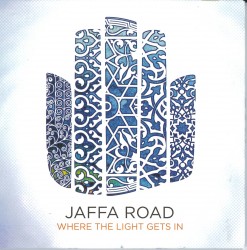 In brief:Toronto’s premiere Middle Eastern-South Asian fusion band Jaffa Road have just released Where the Light Gets In (JR0002 www.jaffaroad.com), a welcome follow-up to their 2009 release Sunplace. The distinctive vocals of Aviva Chernick, singing in English, Hebrew, French and Ladino, are complemented by multi-instrumentalists Aaron Lightstone, Chris Gartner, Jeff Wilson and Sundar Viswanathan playing a plethora of Western and Middle Eastern plucked, blown and struck acoustic and electric instruments. All share writing credits for the bulk of the material, although one notable exception is Through the Mist of Your Eyes by the group’s “friend and teacher Yair Dalal, a master Iraqi-Israeli musician who lives in Galilee.” The text is sung in Hebrew by Chernick and repeated in Arabic by guest artist Hazan Aaron Bensoussan. It is quite striking how different the same poem sounds in the two languages. All in all Jaffa Road’s creative blending of sacred and secular Jewish songs, classical Arabic and Indian influences with a variety of Western musical styles makes them an innovative force on the Toronto scene and Where the Light Gets In is a worthy testament to this.
In brief:Toronto’s premiere Middle Eastern-South Asian fusion band Jaffa Road have just released Where the Light Gets In (JR0002 www.jaffaroad.com), a welcome follow-up to their 2009 release Sunplace. The distinctive vocals of Aviva Chernick, singing in English, Hebrew, French and Ladino, are complemented by multi-instrumentalists Aaron Lightstone, Chris Gartner, Jeff Wilson and Sundar Viswanathan playing a plethora of Western and Middle Eastern plucked, blown and struck acoustic and electric instruments. All share writing credits for the bulk of the material, although one notable exception is Through the Mist of Your Eyes by the group’s “friend and teacher Yair Dalal, a master Iraqi-Israeli musician who lives in Galilee.” The text is sung in Hebrew by Chernick and repeated in Arabic by guest artist Hazan Aaron Bensoussan. It is quite striking how different the same poem sounds in the two languages. All in all Jaffa Road’s creative blending of sacred and secular Jewish songs, classical Arabic and Indian influences with a variety of Western musical styles makes them an innovative force on the Toronto scene and Where the Light Gets In is a worthy testament to this.
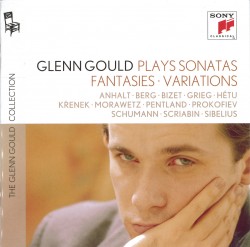 As noted in September’s issue, 2012 marks the 80th anniversary of Glenn Gould’s birth and the 30th of his untimely death. Sony seems determined to make every note that he ever recorded available to us on compact disc and the commemorative sets have begun arriving in volume. You’ll find Dianne Wells’ take on his Richard Strauss recordings further on in this section but one set that I reserved for myself is Glenn Gould plays Sonatas, Fantasies, Variations (88725413742), four CDs that include a lot of music that doesn’t necessarily come to mind when we think of Glenn Gould. Of particular interest to me are the Canadian composers included: Istvan Anhalt, Jacques Hétu, Oskar Morawetz and Barbara Pentland. The disc which includes these pieces also features Alban Berg’s Piano Sonata Op.1and Ernst Krenek’s Sonata for Piano No.3,providing an interesting mix of modern Romantics and some spikier fare. Another disc is devoted to Russians Alexander Scriabin and Sergei Prokofiev while Finland and Norway are represented on another with music of Sibelius and Edvard Grieg, a composer Gould claimed to be related to through his maternal great-grandfather. Perhaps most out of character is the inclusion of Robert Schumann’s Quartet for Piano, Violin, Viola and Cello with members of the Juilliard String Quartet. Although Gould did record the complete Hindemith brass sonatas with members of the Philidelphia Brass Ensemble and the Bach gamba sonatas with cellist Leonard Rose, there really isn’t much in the way of chamber music in his discography, and as far as I know, no other music of Schumann. This final disc also includes another surprise — the Premiere Nocturne and Variations chromatiques de concert by Georges Bizet. While all of this material has been previously released over the years, it is an impressive list of rarities when collected together in a set like this, providing a timely reminder of Gould’s eclecticism and innate curiosity.
As noted in September’s issue, 2012 marks the 80th anniversary of Glenn Gould’s birth and the 30th of his untimely death. Sony seems determined to make every note that he ever recorded available to us on compact disc and the commemorative sets have begun arriving in volume. You’ll find Dianne Wells’ take on his Richard Strauss recordings further on in this section but one set that I reserved for myself is Glenn Gould plays Sonatas, Fantasies, Variations (88725413742), four CDs that include a lot of music that doesn’t necessarily come to mind when we think of Glenn Gould. Of particular interest to me are the Canadian composers included: Istvan Anhalt, Jacques Hétu, Oskar Morawetz and Barbara Pentland. The disc which includes these pieces also features Alban Berg’s Piano Sonata Op.1and Ernst Krenek’s Sonata for Piano No.3,providing an interesting mix of modern Romantics and some spikier fare. Another disc is devoted to Russians Alexander Scriabin and Sergei Prokofiev while Finland and Norway are represented on another with music of Sibelius and Edvard Grieg, a composer Gould claimed to be related to through his maternal great-grandfather. Perhaps most out of character is the inclusion of Robert Schumann’s Quartet for Piano, Violin, Viola and Cello with members of the Juilliard String Quartet. Although Gould did record the complete Hindemith brass sonatas with members of the Philidelphia Brass Ensemble and the Bach gamba sonatas with cellist Leonard Rose, there really isn’t much in the way of chamber music in his discography, and as far as I know, no other music of Schumann. This final disc also includes another surprise — the Premiere Nocturne and Variations chromatiques de concert by Georges Bizet. While all of this material has been previously released over the years, it is an impressive list of rarities when collected together in a set like this, providing a timely reminder of Gould’s eclecticism and innate curiosity.
We welcome your feedback and invite submissions. CDs and comments should be sent to: The WholeNote, 503–720 Bathurst St., Toronto ON M5S 2R4. We also encourage you to visit our website, thewholenote.com, where you can find added features including direct links to performers, composers and record labels, and additional, expanded and archival reviews.
— David Olds, DISCoveries Editor, discoveries@thewholenote.com



